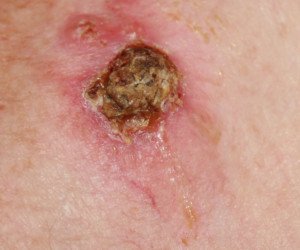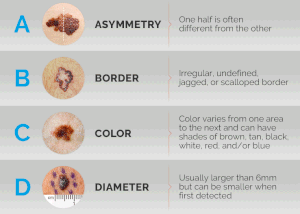
Can a non-healing scab be benign or is it always cancer?
You’ve probably heard for years that one of the classic signs of cancer is “a scab that won’t heal.” But is a non-healing scab always a sign of cancer?
“A non-healing lesion can be completely benign or could be malignant (cancerous),” says Gary Goldenberg, MD, of Goldenberg Dermatology, and assistant professor of dermatology and pathology at Mount Sinai School of Medicine.
“It really depends on the lesion in question.
“Sometimes something does not heal simply because more time is needed.
“This is especially true in the elderly and on the legs.”
But what if a lot of time has passed and the scab still has not healed?
Yes, cancer can be a cause, but there are a few more benign explanations for why a scab has not healed after a period of time. One of them is a low grade infection at the site that can be caused by bacteria or fungus.
Another benign cause is repeated trauma to the site that you may not even be aware of, such as a clothing strap or button chafing against the area.
If the non-healing scab is on your face, it’s possible that you’ve been unknowingly traumatizing the area over and over by habitually scratching there or rubbing the area as a stress habit.
If the non-healing lesion is on a leg, have you been unknowingly running a razor blade over the spot when shaving?
Cancer and a Scab that Won’t Heal
Dr. Goldenberg explains, “A more concerning scenario is when a non-healing lesion is a sign of underlying cancer.

A skin cancer that strongly resembles a common scab. Shutterstock/terry meador
“These lesions often ‘try’ to heal, only to scab and bleed again. A bleeding lesion is particularly concerning.
“The way to diagnose the lesion is to have a dermatologist perform a biopsy; this is a procedure in which the doctor will take a piece of skin and send it in for a pathology diagnosis.
“I always advise my patients to see me if they have a non-healing, bleeding lesion, to make sure it’s not cancerous.”


Dr. Goldenberg of Goldenberg Dermatology provides comprehensive care in medical and cosmetic dermatology, including melanoma and other skin cancer, moles, psoriasis, eczema and acne. He is the medical director of the Dermatology Faculty Practice, NY.
 Lorra Garrick has been covering medical, fitness and cybersecurity topics for many years, having written thousands of articles for print magazines and websites, including as a ghostwriter. She’s also a former ACE-certified personal trainer.
Lorra Garrick has been covering medical, fitness and cybersecurity topics for many years, having written thousands of articles for print magazines and websites, including as a ghostwriter. She’s also a former ACE-certified personal trainer.
.









































